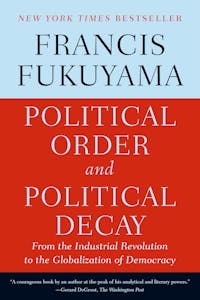Political Order and Political Decay
From the Industrial Revolution to the Globalization of Democracy
 Download image
Download image
ISBN10: 0374535620
ISBN13: 9780374535629
Trade Paperback
688 Pages
$20.00
CA$27.00
Writing in The Wall Street Journal, David Gress called Francis Fukuyama's Origins of Political Order "magisterial in its learning and admirably immodest in its ambition." In The New York Times Book Review, Michael Lind described the book as "a major achievement by one of the leading public intellectuals of our time." And in The Washington Post, Gerard DeGrott exclaimed "this is a book that will be remembered. Bring on volume two."
Volume two is finally here, completing the most important work of political thought in at least a generation. Taking up the essential question of how societies develop strong, impersonal, and accountable political institutions, Fukuyama follows the story from the French Revolution to the so-called Arab Spring and the deep dysfunctions of contemporary American politics. He examines the effects of corruption on governance, and why some societies have been successful at rooting it out. He explores the different legacies of colonialism in Latin America, Africa, and Asia, and offers a clear-eyed account of why some regions have thrived and developed more quickly than others. And he boldly reckons with the future of democracy in the face of a rising global middle class and entrenched political paralysis in the West.
Reviews
Praise for Political Order and Political Decay
"What makes this book so illuminating is the breadth of Fukuyama's perception. In contrast to many popular theorists, he resists the temptation of the single big idea and instead argues, much more convincingly, that order and disorder result from the complex interplay of myriad factors, including identity, geography, commerce, tradition, climate and simple luck . . . Political Order and Political Decay is a courageous book by an author at the peak of his analytical and literary powers. This project started as an attempt to rewrite and update Samuel Huntington's classic Political Order in Changing Societies, published in 1968. Yet Fukuyama has what Huntington sorely lacked, namely the ability to communicate complex ideas through engaging prose. He's both a perceptive political analyst and a wonderful storyteller. Clearly, something has indeed gone haywire in our world: Serious political science is not supposed to be so enjoyable."—Gerard De Groot, The Washington Post
"[Fukuyama] covers a vast amount of ground, summarizing an extraordinary amount of research and putting forward a welter of arguments on an astonishing range of topics . . . He surely understands that authoritarianism is even more likely to generate state weakness than democracy since without free media, an active civil society and regular elections, authoritarianism has more opportunities to make use of corruption, clientelism and predation than democracies do. Perhaps Fukuyama's most interesting section is his discussion of the United States, which is used to illustrate the interaction of democracy and state building."—Sheri Berman, The New York Times Book Review
"Fukuyama's analysis provides a neat checklist for assessing the political health of the world's rising powers . . . Fukuyama points out the irony that the US institutions that currently poll best with the American people—the armed forces, NASA—are the ones that experience the least democratic oversight. The institutions Americans really hate—such as Congress—are the ones they control themselves. This book offers the best account I have read of how we reached this point."—David Runciman, Financial Times
"The reader cannot but be impressed by the facility with which he introduces and swiftly outlines such matters as the social construction of nationhood, the legitimacy gap afflicting governments in modern-day Mediterranean countries, Montesquieu's account of the relationship between geography and institutions, et very much cetera."—David Polansky, The Wall Street Journal
Reviews from Goodreads
BOOK EXCERPTS
Read an Excerpt
1
WHAT IS POLITICAL DEVELOPMENT?
Political development and its three components: the state, rule of law, and accountability; why all societies are subject to political decay; the plan for the book; why it is good...



